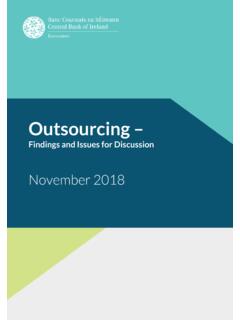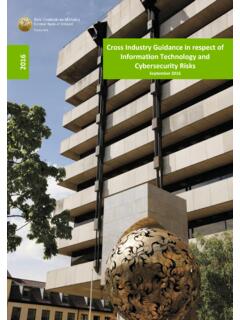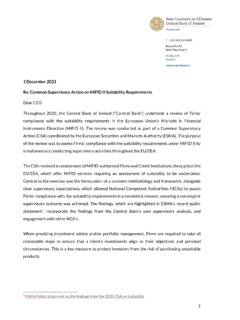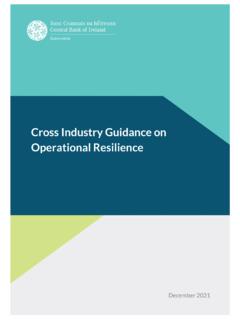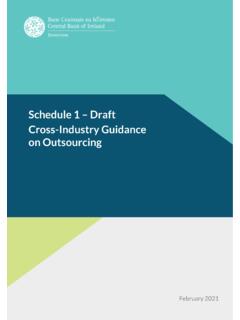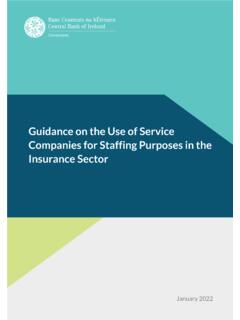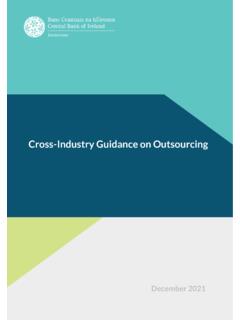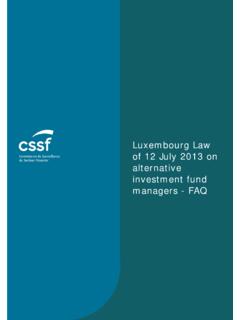Transcription of Fund Management Companies - Guidance
1 Fund Management Companies - Guidance 1 Fund Management Companies Guidance December 2016 2016 Fund Management Companies - Guidance 1 Contents Part I. Delegate Oversight 2 Part II. Organisational Effectiveness 24 Part III. Directors Time Commitments 26 Part IV. Managerial Functions 30 Part V. Operational Issues 102 Part VI. Procedural matters 109 Fund Management Companies - Guidance 2 Adherence to Guidance 1. It should be evident from the fund Management company s board minutes that the fund Management company is acting in accordance with this Guidance , if this is the case. PART I Delegate Oversight Scope 1. This Part sets out the Central Bank s Guidance for boards of directors of investment Companies , UCITS Management Companies , alternative investment fund managers (AIFMs) and AIF Management Companies incorporated and authorised in Ireland (referred to in this Part as relevant Companies ).
2 2. A board of a relevant company has ultimate responsibility for all aspects of Management that are not specifically reserved to the shareholders (whether by constitutive documents or applicable law1). While boards may delegate tasks internally, it is also common in Ireland for certain tasks to be delegated externally. The focus of this document is on the role of boards where significant tasks are delegated externally. It is not deemed necessary at this time to issue Guidance on other aspects of a board s work. In those regards, boards are recommended to exercise prudent judgement having regard to, but not necessarily confining themselves to, widely accepted standards of good governance and to have regard to the particular challenges of the relevant company. 3. Such delegation, and the legal responsibilities of delegates, does not reduce the board s ultimate responsibility. It follows that the board must, notwithstanding 1 In particular, under the Companies Act 2014 or the Irish Collective Asset- Management Vehicles Act 2015 Fund Management Companies - Guidance 3 any such delegation, at all times retain and exercise overall control of the relevant company s Management .
3 4. There are also limits on the extent to which delegation is legally permissible. In particular, under European legislation as transposed, AIFMs and UCITS Management Companies are under an obligation not to delegate to the extent that they become letterbox entities2. 5. The responsibilities of a UCITS Management company and an AIFM, as set out in applicable legislation, differ. A UCITS Management company is defined as a company whose regular business is the Management of UCITS (defined as including investment Management , fund administration and distribution). An AIFM may carry on all these functions but is required to perform investment Management (defined as encompassing portfolio Management and risk Management ). In this Part, no distinction is drawn between UCITS and AIFs, but, in the application of the Guidance it sets out, account should be taken of the specific circumstances which prevail. 6. The scope of this Part covers: A.
4 investment Management B. distribution C. risk Management (both operational and investment risk) D. operation and administration E. support and resourcing F. boards of externally-managed investment Companies 7. The main body of this Part concerns the responsibilities of relevant Companies (and, by extension, of their boards, which have ultimate Management responsibility) which are authorised in Ireland as AIFMs or UCITS Management Companies . This encompasses: self-managed UCITS and AIFs; and 2 Regulation 23(2) of the EC (UCITS) Regulations 2011 and Regulation 21(4) of the EU (AIFM) Regulations 2013. Fund Management Companies - Guidance 4 UCITS Management Companies and AIFMs. 8. In some cases UCITS Management Companies and AIFMs will have been appointed by investment Companies ( UCITS or AIFs). A further section F therefore addresses issues specific to the responsibilities retained by such investment Companies (and, by extension, their boards).
5 9. In this Part the term: delegate means, in the context of any relevant company or the board of any relevant company, the fund administration company, investment manager, risk manager and distributor; depositary , in the context of an investment fund, includes reference to any trustee or custodian, if applicable, of that investment fund; investment company means an investment company authorised in accordance with Part 24 of the Companies Act 2014 or the European Communities (Undertakings for Collective investment in Transferable Securities) Regulations 2011 ( No. 352 of 2011) or an Irish Collective Asset- Management Vehicle ( ICAV ) registered with and authorised by the Central Bank under the ICAV Act 2015; investment fund means a collective investment scheme whether structured as an investment company, unit trust, common contractual fund, investment limited partnership or otherwise3; fund Management company means an entity regulated as an AIFM or a UCITS Management company4 in each case incorporated or otherwise organised, and authorised under the laws of Ireland.
6 In the context of section F, however, it may encompass a Management company organised and authorised in another EU member state or an AIFM established outside the EU; and 3 investment funds may be organised and authorised under the laws of jurisdictions other than Ireland. The laws applicable to such an investment fund may impose on a Management company additional, or alternative, obligations to those imposed in the case of an Irish investment fund. The Central Bank has focussed only on investment funds organised and authorised under the laws of Ireland and has assumed that nothing in the laws of such other jurisdictions would affect the recommendations made in this Part. Of course, the board of a Management company must be satisfied that the Management company has complied with all applicable legal and regulatory requirements. It follows therefore that it should also be satisfied that there is no conflict between the respective requirements of each relevant jurisdiction.
7 4 This includes any self-managed investment company which is itself regulated as an AIFM or UCITS Management company Fund Management Companies - Guidance 5 investment Management means that which, in an AIFMD context, would be encompassed by the portfolio Management aspects of investment Management . 10. The provisions set out in this Part are intended to assist relevant Companies by providing an overview of the approach recommended by the Central Bank. This Part does not purport to address every aspect of such practice in detail. The overriding approach should be that the board should design its governance practices so as to be appropriate and commensurate to the business of the relevant company and, where applicable, the investment funds it manages. General observations Relationship between fund Management company and delegates 11. Good governance requires clarity as to the allocation of responsibilities, documented policies and procedures, structures which foster constructive challenge, and the effective provision of appropriate information to boards.
8 The adoption by a board of the general approach identified in this Part will not in itself achieve the objective of good governance. The environment and culture in which such an approach operates are also key. 12. The relationship between a fund Management company and a delegate must be such as to enable competent and appropriate Management of the fund Management company and a shared understanding as to how to achieve it. The following features are essential to such a relationship: Openness: Full, frank and open dialogue between the board and the delegates is essential. A delegate should provide all information that the board needs in order to discharge its responsibilities. The scope of that information should be clearly identified by the board and agreed with the delegate; Engagement: Directors should be attentive to their duties as directors and dedicate sufficient time to their discharge. The Central Bank s Guidance on directors time commitments is relevant in this regard.
9 A Fund Management Companies - Guidance 6 delegate should recognise the directors duties and facilitate the discharge by the directors of their ultimate responsibility for the delegated tasks; Co-operation: A fund Management company and its delegates should recognise their common interest in a well-run fund Management company that serves the interests of investors in the funds that it manages. Dialogue: A delegate should accept that directors, in order to discharge their duties, may need to seek further information on proposals and performance, ask probing questions and provide constructive criticism. The relationship between the delegate and the board should be such that directors are encouraged to do so. Nothing in the way directors are appointed or support is provided to directors should signal any reluctance on the part of delegates to support open board-level challenge.
10 13. The relationship between the fund Management company and its delegates should be such as will support and facilitate the exercise by the board of its ultimate responsibility for, and control over, the Management of that fund Management company. Retained tasks and delegated tasks 14. A fund Management company may, notwithstanding the ultimate Management responsibility of its board, delegate in whole or in part certain specific tasks which form part of the fund Management company s Management functions. While the tasks may be delegated, however, ultimate responsibility for those Management functions themselves cannot be delegated. Delegation is permitted but responsibility is retained. The terms of any delegation should, therefore, be such as will facilitate the discharge by directors of: their duties to the relevant fund Management company (including those relating to that company s discharge of its obligations in respect of investment funds it manages); and Fund Management Companies - Guidance 7 any other responsibilities assumed by them to other persons, for example to shareholders (investors) pursuant to the prospectus, where it is a self-managed investment company.
